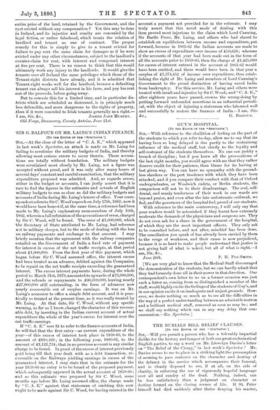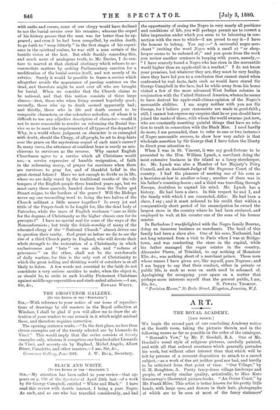THE BURIALS BILL RELIEF CLAUSES.
(To THE EDITOR OF Till " SPECTATOR:1 SIR,—Will you permit a person who has a tolerably impartial dislike for the history and temper of both our great ecclesiastical English parties, to say a word on Mr. Llewelyn Davies's letter on"The Relief of the Clergy," in last week's Spectator ? Mr. Davies seems to me to place in a striking light the presumption of seeming to pass sentence on the character and destiny of the defunct in the service which accompanies their funeral, and is clearly disposed to err, if at all, on the side of charity, in enforcing the use of vigorously hopeful language over all and sundry of the dead. Nothing, indeed, can be less satisfactory than a judgment on character or destiny formed on the closing scenes of life. If St. Peter himself had died suddenly after thrice denying his master,
with oaths and curses, some of our clergy would have declined to use the burial service over his remains ; whereas the sequel of his history proves that the man was far better than he ap- peared; and even if he had been compelled, by sudden death, to go forth to "weep bitterly" in the first stages of his experi- ence in the spiritual realms, he was still a man certain of the beatific vision at the last. But while frankly conceding this, and much more of analogous truth, to Mr. Davies, I do ven- ture to marvel at that clerical obstinacy which refuses to ac- commodate matters by seeking Parliamentary sanction for a modification of the burial service itself, and not merely of its rubrics. Surely it would be possible to frame a service which altogether avoids the appearance of passing sentence on the dead, and therefore might be used over all who are brought for burial. When we consider that the Church claims to be national, and that this nation consists of three large classes—first, those who when living seemed hopefully good ; secondly, those who up to death seemed apparently bad ; and thirdly, those who in life and death seemed to be composite characters, or else colourless nobodies, of whom it is difficult to use any adjective descriptive of character—would it not be more reasonable to resolve on reforming the Burial Ser- vice so as to meet the requirements of all types of the departed ? Why, in a world where judgment on character is so entangled with doubt, should the Clergy, of all people, be set to drop hints over the grave on the mysterious sequel of each man's career ? In many cases, the utterance of confident hope is surely as mis- chievous to survivors as the reverse. Why cannot English Churchmen agree to a service which all Christians would use,—a service expressive of humble resignation, of faith in the redeeming mercy, of prayer for survivors when there are survivors to pray for, and of thankful belief in the great eternal future ? Have we not enough to divide us in life, where we are daily vexed by the traditional results of the vile tempers of the English people three hundred years ago, but we must carry these quarrels, handed down from the Tudor and Stuart reigns, to the borders of the grave ? Will the Bishops never say one reconciling word to bring the two halves of the Church militant a little nearer together ? Is every jot and tittle of the Prayer-book to be fought for, like the dead body of Patroclus, while the mass of English workmen "care as little for the dogmas of Christianity as the higher classes care for its precepts P" I have no special zeal for some of the ways of the Nonconformists; but truly the fetish-worship of many of the educated clergy of the "National Church" almost drives one to question their sanity. God grant us before we die to see the rise of a third Church party in England, who will devote their whole strength to the restoration of a Christianity in which exclusiveness and " hate " on one side, and "redress of grievances" on the other, shall not be the watchwords of daily warfare, for this is the only sort of Christianity to which the great toiling and thinking world of outsiders is at all likely to listen. A few words not essential to the faith do not constitute a very serious sacrifice to make, when the object is, or should be, to unite in each locality Protestant Christians against middle-age superstition and stark-naked atheism.—I am,



































 Previous page
Previous page